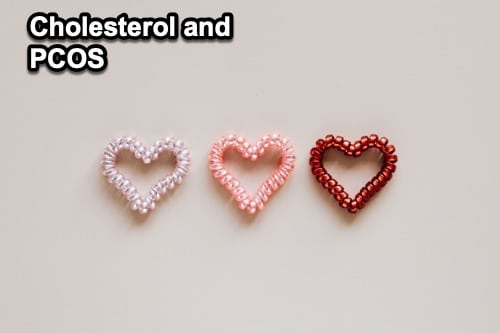What is cholesterol?
Cholesterol is a fatty substance that is present in all cells and is often referred to as a waxy substance that is required to make Vitamin D, hormones, and fat dissolving bile acids. In the body, the liver and intestines make up about 80% of the cholesterol you need to stay healthy1.
While cholesterol is required for important functions in our body, high levels of cholesterol can bind with other substances in the blood forming plaques. These plaques can stick to the wall of the arteries which may cause a build-up and eventually could lead to atherosclerosis. Treating high cholesterol is important to reduce your risk for cardiovascular disease which we know is high Polycystic Ovarian Syndrome (PCOS)4.
How is insulin resistance connected?
When insulin resistance is present, it can result in changes in the cholesterol panel as below:
High Density Lipoprotein aka HDL – this type of cholesterol is known as our “good” cholesterol since it will transport cholesterol to your liver to be removed from your body. It is common to see HDL reduced when insulin resistance is present.
Low Density Lipoprotein aka LDL – this type of cholesterol is known as our “bad” cholesterol since higher levels can lead to a build-up of plaques in your arteries. It is common to see LDL increased when insulin resistance is present.
Triglycerides – this is a type of fat that is important when it comes to insulin resistance. Triglycerides come from the food we eat such as butter, margarine, and oils. Additionally, alcohol, sugar and carbohydrates can be turned into triglycerides and stored in the body as fat cells. High triglycerides can be an indication that insulin resistance is present.
What causes high cholesterol?
The most common cause of high cholesterol includes an unhealthy lifestyle. This can include eating unhealthy fat such as saturated fats commonly found in meat, dairy products, baked goods, fried foods and processed foods. Trans fats can also raise bad cholesterol levels.
Additionally, high levels of cholesterol can be due to family history of high cholesterol.
How can you reduce cholesterol?
Diet – the number one thing you can focus on when cholesterol is high is your diet. Reducing foods that are high in saturated fats, baked goods, fried foods and processed foods can really help to lower cholesterol and help to manage insulin resistance. Focusing on a whole food diet including lean meats, lots of vegetables, healthy fats and complex carbohydrates is key to managing cholesterol.
Fish consumption- fish has a very unique composition of nutrients that not only help metabolic function but also hormones. These nutrients include omega-3 fatty acids, iodine, selenium, Vitamin D, taurine and carnitine. Regular fish consumption has been shown to reduce the risk of developing metabolic syndrome, which is a syndrome that increases your risk for heart disease and diabetes3.
Reducing carbohydrates – as mentioned above, carbohydrates can turn into triglycerides and then get stored as fat. Reducing carbohydrates and eating good lean meats, healthy fats such as avocadoes nuts and seeds and lots of veggies can help to balance insulin resistance and triglyceride levels.
Omega 3 supplementation – a recent meta-analysis which complies studies on a single topic from various databases concluded that omega 3 supplementation for women with PCOS resulted in improvements in total cholesterol, triglycerides, LDL, HDL, and insulin levels5.
Berberine – this is a herb that has been used for thousands of years in Traditional Chinese Medicine. Research shows that berberine has the ability to reduce total cholesterol, LDL (aka bad cholesterol) and triglycerides2.
References
- Corliss, J. (2021). How it’s made: Cholesterol production in your body – Harvard Health. Retrieved 3 August 2021, from https://www.health.harvard.edu/heart-health/how-its-made-cholesterol-production-in-your-body#:~:text=Cholesterol%20also%20is%20needed%20to,you%20need%20to%20stay%20healthy.
- Koppen, L. M., Whitaker, A., Rosene, A., & Beckett, R. D. (2017). Efficacy of Berberine Alone and in Combination for the Treatment of Hyperlipidemia: A Systematic Review. Journal of Evidence-Based Complementary & Alternative Medicine, 22(4), 956. https://doi.org/10.1177/2156587216687695
- Mendivil, C. O. (2021). Fish Consumption: A Review of Its Effects on Metabolic and Hormonal Health. Nutrition and Metabolic Insights, 14, 117863882110223. https://doi.org/10.1177/11786388211022378
- Scicchitano, P., Dentamaro, I., Carbonara, R., Bulzis, G., Dachille, A., Caputo, P., … Ciccone, M. M. (2012). Cardiovascular Risk in Women With PCOS. International Journal of Endocrinology and Metabolism, 10(4), 611. https://doi.org/10.5812/IJEM.4020
- Y, X., Y, W., M, C., & D, S. (2021). Efficacy of omega-3 fatty acid supplementation on cardiovascular risk factors in patients with polycystic ovary syndrome: a systematic review and meta-analysis. Annals of Palliative Medicine, 10(6), 6425–6437. https://doi.org/10.21037/APM-21-1050





